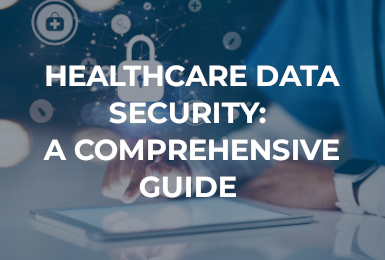If you're looking to enter a high-growth career field and are doing your research on the most in-demand jobs, you've probably seen that healthcare administration is at the top of many lists. There's good reason for this: the Bureau of Labor Statistics has excellent projections for the field, with a 20% growth rate and a median pay of over $96,500 per year. If your interest is piqued by these compelling numbers but you're curious about how to get into healthcare administration, read on to learn more about this exciting, dynamic field.
What Is Healthcare Administration?
First off, it's helpful to have a clear understanding of what healthcare administration is. Essentially, this field involves the management of the business side of healthcare-focused organizations, institutions, and businesses. If you are interested in healthcare but do not want to work in a medical role, this is the career for you!
If you're still wondering, "What does a healthcare administrator do?", be aware that there's no clear-cut answer, as healthcare administration roles can vary greatly from position to position. Typical responsibilities of a healthcare administrator may include staffing, budget and financial management, administrative duties, facility oversight, program operations, external relations, policy development, and team leadership.
While almost all individuals who get a degree in healthcare administration end up working in the healthcare field, they are qualified to work in a number of different types of organizations, including hospitals, private medical facilities, government offices, schools and universities, mental health facilities, nursing homes, or insurance companies, among others.
How to Become a Healthcare Administrator
If you're looking to enter the healthcare administration field, related work experience is a must. Most employers require at least some experience working in a healthcare environment, whether it's on the medical or administrative side. These do not have to be high-level roles: many healthcare administrators come to the field from entry-level positions such as medical record clerks, health information technicians, administrative assistants, or medical assistants.
In addition, a degree is required for most healthcare administration roles. You will almost always need at least a bachelor's degree to enter the field, and for many roles, a master's degree is required as well, especially those with higher pay and increased responsibility. If this is a field that interests you, it's a smart decision to plan on getting a master's degree at some point, even if it's a few years down the road.
Careers in Healthcare Administration
Healthcare administration offers a wide array of career opportunities for individuals interested in leadership, operations, and strategic planning within the healthcare sector. From executive leadership to specialized program management, each position plays a vital part in ensuring healthcare systems run smoothly and deliver high-quality patient care.
Executive-Level Roles
- Hospital Chief Executive Officer (CEO): The CEO is the highest-ranking executive in a hospital and is responsible for the overall operation and strategic direction of the facility. This role involves collaboration with healthcare professionals, managing health services, and ensuring compliance with healthcare regulations.
- Hospital Chief Financial Officer (CFO): The CFO manages a hospital's financial planning, reporting, and budgeting. They play a key role in maintaining financial health and resource allocation, essential for delivering quality patient care in a cost-effective way.
- Healthcare Chief Information Officer (CIO): The CIO oversees health information systems, including electronic health records and data security. They are vital to integrating technology with patient services and ensuring that healthcare facilities operate efficiently.
- Chief Nursing Officer (CNO): The CNO is responsible for nursing staff and policies, ensuring high standards of patient care. This executive role often involves coordinating with other departments to implement best practices across healthcare systems.
Facility & Program Leadership
- Hospital Administrator: Hospital administrators manage the day-to-day operations of healthcare facilities. They handle staffing, budgeting, and compliance to ensure the smooth delivery of healthcare services.
- Nursing Home Administrator: Nursing home administrators oversee long-term care facilities. They manage personnel, resident care, regulatory compliance, and the overall administration of healthcare services in these specialized settings.
- Assisted Living Residence Administrator: These professionals manage assisted living facilities, focusing on delivering compassionate and effective patient care while ensuring the safety and well-being of residents.
- Medical Director: The medical director leads the clinical operations of a healthcare facility or program. They work closely with healthcare professionals to establish clinical guidelines, improve patient outcomes, and oversee quality assurance initiatives.
Mid-Level and Specialized Roles
- Director of Nursing: The director of nursing supervises nursing departments within hospitals or long-term care facilities. They focus on staff development, patient care quality, and adherence to healthcare regulations.
- Clinical Informatics Manager: These managers oversee the integration of data and technology into medical practice. Their work improves healthcare delivery by optimizing health information systems and clinical workflows.
- Healthcare Consultant: Healthcare consultants advise healthcare organizations on strategic planning, efficiency improvements, and regulatory compliance. They are instrumental in enhancing the performance of healthcare systems.
- Health Information Manager: Health information managers maintain and secure patient records in compliance with legal standards. Their work supports both patient care and healthcare administration efforts by ensuring the accuracy and availability of health data.
- Medical Records Manager: These professionals manage the collection, storage, and retrieval of patient health records. Their role supports the delivery of quality patient care and ensures that healthcare facilities meet data management standards.
Human Resources & Government Roles
- Nursing Recruiter: Nursing recruiters specialize in sourcing and hiring qualified nursing staff for healthcare facilities. They play a critical role in maintaining staffing levels necessary for efficient patient services.
- Government Agency Healthcare Administrator: These administrators work in public health departments or federal agencies, overseeing programs that impact community health services. Their role includes policy development, program management, and regulatory oversight.
- Health Service Manager: Health service managers plan, direct, and coordinate health services in hospitals, clinics, or public health organizations. They are key players in maintaining the efficiency and quality of healthcare delivery.
- Healthcare Administrator: In this versatile role, administrators work across various healthcare settings, managing operations, budgeting, compliance, and staff coordination. A healthcare administration degree prepares graduates for this foundational role in the healthcare sector.
Master’s in Healthcare Administration vs. MBA in Healthcare Administration
When exploring graduate programs in healthcare leadership, you’ll likely encounter two popular options: a Master’s in Healthcare Administration (MHA) and an MBA with a concentration in Healthcare Administration. Many individuals are unsure of the difference between the two programs, and don't know which one to pursue. The good news is that both of these master's degrees will more than prepare you for your healthcare administration career. However, there are some key differences between them, which will affect your decision of which one to pursue.
An MBA in Healthcare Administration provides a strong foundation in core business principles–such as finance, accounting, leadership, and marketing–while integrating healthcare-specific courses. This path is ideal if you’re looking for versatile, transferable skills that apply across industries, with the added benefit of healthcare-focused insights in areas like system design, healthcare finance, and healthcare law.
On the other hand, a Master’s in Healthcare Administration offers a deeper, more specialized focus in healthcare systems and leadership. While it may cover similar business topics, each course is tailored specifically to the healthcare field. For example, leadership training in an MHA program centers on the dynamics of leading healthcare teams and navigating the complexities of healthcare organizations. Classroom discussions are typically shaped by peers who share similar backgrounds and goals, creating a focused learning environment.
Ultimately, graduates of both programs are well-prepared for successful careers in healthcare management, but your decision should depend on your goals. Choose an MBA if you value broad business versatility with a healthcare edge. Opt for an MHA if you prefer an immersive, healthcare-centric education with targeted expertise.
How Long Does It Take to Become a Healthcare Administrator?
This question really depends on where you are in your career, and what your background is in. As mentioned above, you will usually need a bachelor's degree in healthcare administration or a related subject, which takes most students four years to complete (though it can be completed sooner through accelerated courses and transfer credits where applicable). To be eligible for higher-paying roles that involve more responsibility and experience, you may want to pursue a master's degree, which can usually be completed in one to two years. However, the good news is that whether you get a bachelor's degree in healthcare administration or a master's degree, you will be qualified to enter the field right away - so beyond the time it takes you to complete your education, you don't have to delay getting started!
Download Program Guide
Learn what you can expect from our online bachelor's in healthcare administration program.

Download Program Guide
I acknowledge that, by clicking the "submit" button, I am giving my express written consent to Champlain College and its representatives to contact me about educational opportunities via email, text, or phone, at the phone number above, including my mobile phone, using an automatic dialer, or pre-recorded message. Message and data rates may apply. I understand that my consent is not a requirement for enrollment, and I may withdraw my consent at any time.






